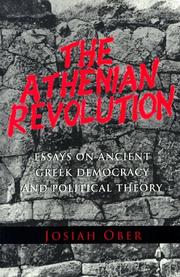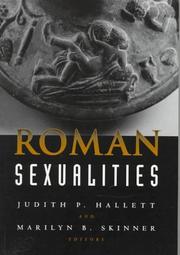| Listing 1 - 4 of 4 |
Sort by
|
Book
Year: 1983 Publisher: Amsterdam Elsevier
Abstract | Keywords | Export | Availability | Bookmark
 Loading...
Loading...Choose an application
- Reference Manager
- EndNote
- RefWorks (Direct export to RefWorks)
World history --- History of the Netherlands --- Asscher, A. --- Cohen, D. --- anno 1940-1949
Book
ISBN: 9010046567 Year: 1983 Publisher: Amsterdam Brussel Elsevier
Abstract | Keywords | Export | Availability | Bookmark
 Loading...
Loading...Choose an application
- Reference Manager
- EndNote
- RefWorks (Direct export to RefWorks)
Asscher, A. --- Cohen, D. --- Guerres --- Jodendom --- Judaïsme --- Oorlogen --- Politiek --- Politique --- Holocaust, Jewish (1939-1945) --- Jews --- Hebrews --- Israelites --- Jewish people --- Jewry --- Judaic people --- Judaists --- Biography --- Politics and government --- Asscher, Abraham, --- Cohen, David, --- Netherlands --- Ethnic relations. --- Ethnology --- Religious adherents --- Semites --- Judaism

ISBN: 9780691010953 0691001901 0691010951 9780691001906 0691217971 Year: 1996 Publisher: Princeton (N.J.): Princeton university press,
Abstract | Keywords | Export | Availability | Bookmark
 Loading...
Loading...Choose an application
- Reference Manager
- EndNote
- RefWorks (Direct export to RefWorks)
Where did "democracy" come from, and what was its original form and meaning? Here Josiah Ober shows that this "power of the people" crystallized in a revolutionary uprising by the ordinary citizens of Athens in 508-507 B.C. He then examines the consequences of the development of direct democracy for upper-and lower-class citizens, for dissident Athenian intellectuals, and for those who were denied citizenship under the new regime (women, slaves, resident foreigners), as well as for the general development of Greek history. When the citizens suddenly took power into their own hands, they changed the cultural and social landscape of Greece, thereby helping to inaugurate the Classical Era. Democracy led to fundamental adjustments in the basic structures of Athenian society, altered the forms and direction of political thinking, and sparked a series of dramatic reorientations in international relations. It quickly made Athens into the most powerful Greek city-state, but it also fatally undermined the traditional Greek rules of warfare. It stimulated the development of the Western tradition of political theorizing and encouraged a new conception of justice that has striking parallels to contemporary theories of rights. But Athenians never embraced the notions of inherency and inalienability that have placed the concept of rights at the center of modern political thought. Thus the play of power that constituted life in democratic Athens is revealed as at once strangely familiar and desperately foreign, and the values sustaining the Athenian political community as simultaneously admirable and terrifying
Idées politiques --- Démocratie --- Athènes (Grèce) --- Grèce --- Politique et gouvernement --- Democracy --- History. --- Grèce ancienne --- Politique --- Democracy - Greece - Athens - History --- Self-government --- Political science --- Equality --- Representative government and representation --- Republics --- History --- Democracy. --- Greece --- al-Yūnān --- Ancient Greece --- Ellada --- Ellas --- Ellēnikē Dēmokratia --- Elliniki Dimokratia --- Grčija --- Grèce --- Grecia --- Gret︠s︡ii︠a︡ --- Griechenland --- Hellada --- Hellas --- Hellenic Republic --- Hellēnikē Dēmokratia --- Kingdom of Greece --- République hellénique --- Royaume de Grèce --- Vasileion tēs Hellados --- Xila --- Yaṿan --- Yūnān --- Ελληνική Δημοκρατία --- Ελλάς --- Ελλάδα --- Греция --- اليونان --- يونان --- 希腊 --- Aeschines. --- Bowles, S. --- Bugh, G. --- Cohen, D. --- Connor, W. R. --- Council, role of. --- Dover, K. J. --- Finley, M. I. --- Golden Age myths. --- Gomme, A. W. --- Hansen, M. H. --- Hanson, V. D. --- Iron Law of Oligarchy. --- Isagoras. --- Jones, A.H.M. --- Kagan, D. --- Knight, D. W. --- Loraux, N. --- MacDowell, D. M. --- Meier, C. --- Ostwald, M. --- Petrey, S. --- Rawls, J. --- Sinclair, R. K. --- atimia. --- decision-making. --- democratic ideology. --- evidence, problems of. --- exclusion, and citizenship. --- foundationalism. --- justice. --- koinōnia. --- liberalism. --- noncitizens: and the polis. --- objectivity. --- politeia. --- positivism. --- pragmatism. --- regime of truth, democratic. --- social contract theory.

ISBN: 0691011788 0691011796 0691219540 Year: 1997 Publisher: Princeton : Princeton University Press,
Abstract | Keywords | Export | Availability | Bookmark
 Loading...
Loading...Choose an application
- Reference Manager
- EndNote
- RefWorks (Direct export to RefWorks)
This collection of essays seeks to establish Roman constructions of sexuality and gender difference as a distinct area of research, complementing work already done on Greece to give a fuller picture of ancient sexuality. By applying feminist critical tools to forms of public discourse, including literature, history, law, medicine, and political oratory, the essays explore the hierarchy of power reflected so strongly in most Roman sexual relations, where noblemen acted as the penetrators and women, boys, and slaves the penetrated. In many cases, the authors show how these roles could be inverted--in ways that revealed citizens' anxieties during the days of the early Empire, when traditional power structures seemed threatened. In the essays, Jonathan Walters defines the impenetrable male body as the ideational norm; Holt Parker and Catharine Edwards treat literary and legal models of male sexual deviance; Anthony Corbeill unpacks political charges of immoral behavior at banquets, while Marilyn B. Skinner, Ellen Oliensis, and David Fredrick trace linkages between social status and the gender role of the male speaker in Roman lyric and elegy; Amy Richlin interrogates popular medical belief about the female body; Sandra R. Joshel examines the semiotics of empire underlying the historiographic portrayal of the empress Messalina; Judith P. Hallett and Pamela Gordon critique Roman caricatures of the woman-desiring woman; and Alison Keith discovers subversive allusions to the tragedy of Dido in the elegist Sulpicia's self-depiction as a woman in love.
Sex customs --- Sex in literature. --- Classical literature. --- Feminist criticism. --- History. --- Rome --- In literature. --- Social life and customs. --- Classical literature --- Feminist criticism --- Sex in literature --- Customs, Sex --- Human beings --- Sexual behavior --- Sexual practices --- Manners and customs --- Moral conditions --- Sex --- Criticism --- Literature, Classical --- Literature --- Literature, Ancient --- Greek literature --- Latin literature --- History --- Bakhtin, M. --- Bal, M. --- Boatwright, M. T. --- Brown, P. --- Callimachus. --- Cantarella, E. --- Cohen, D. --- Colin, J. --- Dean-Jones, L. --- Dickison, S. --- Dover, K. J. --- Edwards, C. --- Foucault, M. --- Fredrick, D. --- Galen. --- Gleason, M. --- Golden, M. --- Hallett, J. P. --- Halperin, D. M. --- Jane Eyre. --- Kennedy, D. F. --- Konstan, D. --- Levick, B. --- MacMullen, R. --- Newton, E. --- Oliensis, E. --- Ortner, S. B. --- Parker, H. --- Quinn, K. --- Richlin, A. --- Sedgwick, E. --- Sulpicia. --- Trachtenberg, J. --- Veyne, P. --- adultery. --- anthropology. --- dancing. --- fellatio. --- honor. --- infidelity. --- luxury. --- masculinity. --- motherhood. --- nature. --- passivity. --- power: imperial. --- psychoanalysis. --- Sexualitet --- Sexualitet i litteraturen --- Sex customs. --- Manners and customs. --- Rome in literature. --- Ceremonies --- Customs, Social --- Folkways --- Social customs --- Social life and customs --- Traditions --- Usages --- Civilization --- Ethnology --- Etiquette --- Rites and ceremonies --- historia --- Rome (Empire) --- Rim --- Roman Empire --- Roman Republic --- Romi (Empire) --- Byzantine Empire --- Italy
| Listing 1 - 4 of 4 |
Sort by
|

 Search
Search Feedback
Feedback About UniCat
About UniCat  Help
Help News
News